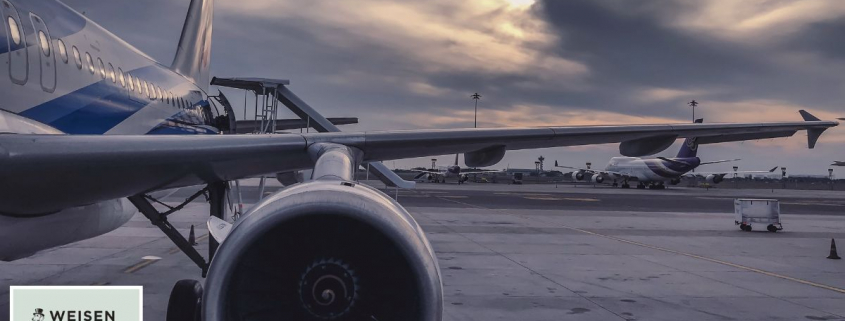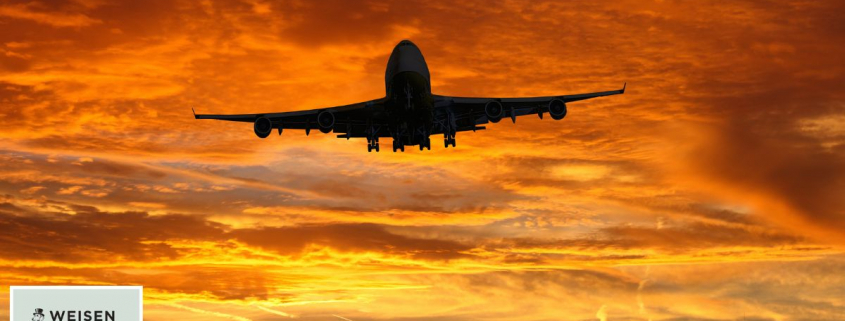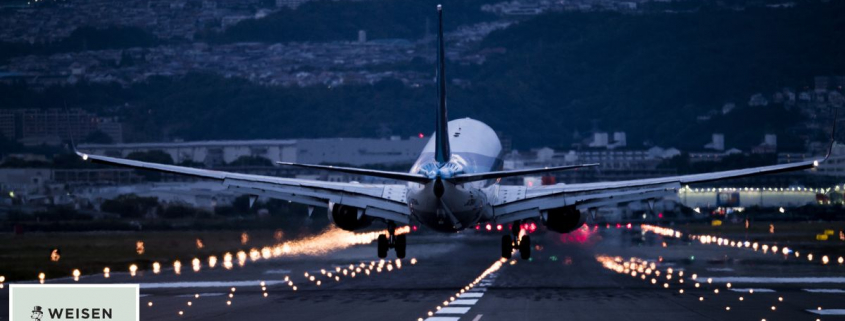Der Luftfahrtsektor in Europa erlebt derzeit eine erhebliche Anzahl von Streiks. In Frankreich gibt es landesweite Proteste wegen einer Reform des Rentensystems, in Deutschland Streiks der Verkehrsgewerkschaft, Betriebsversammlungen bei Austrian Airlines, Streiks des Sicherheitspersonals am Flughafen London-Heathrow und Streiks des Bodenabfertigungspersonals von Swissport in Spanien.
In der Folge sind die Luftfahrtunternehmen gezwungen, zahlreiche Flüge zu verschieben oder zu streichen und sehen sich mit unzufriedenen Fluggästen – und deren Ansprüchen auf Ausgleichszahlungen gemäß Verordnung (EG) 261/2004 – konfrontiert. Es stellt sich die Frage, ob die aktuellen Streiks in Europa zu außergewöhnlichen Umständen im Sinne von Art. 5 (3) dieser Verordnung führen und somit die Luftfahrtunternehmen von ihren Zahlungsverpflichtungen befreien könnten.
Dieser Artikel soll die relevanten Kriterien für die Beurteilung von Streiks erläutern und einen Überblick über die Rechtsprechung des Europäischen Gerichtshofs (EuGH) und österreichischer Gerichte zu verschiedenen Streikkategorien geben.
Die Grundsätze:
Bereits in seinem Urteil C-549/07 hat der EuGH festgestellt, dass Ereignisse als außergewöhnlich anzusehen sind, wenn sie (i) nicht zur normalen Ausübung der Tätigkeit des betreffenden Luftfahrtunternehmens gehören und (ii) sich aufgrund ihrer/seiner Natur oder Ursache der tatsächlichen Kontrolle dieses Unternehmens entziehen.
Diese Grundsätze sind auch bei der Beurteilung von Streiks zu beachten.
Kategorien von Streiks:
Da es bei Streiks eine Vielzahl von Fällen gibt, ist eine Kategorisierung erforderlich, um auf der Grundlage der oben genannten Grundsätze allgemeine Antworten auf die Arten von Streiks zu geben.
Streiks der Beschäftigten des Luftfahrtunternehmens zur Durchsetzung von Forderungen gegenüber dem Luftfahrtunternehmen
In diese Kategorie fallen Streiks, die auf die Durchsetzung von Forderungen gegenüber dem Luftfahrtunternehmen abzielen, insbesondere für bessere Arbeitsbedingungen oder höhere Gehälter.
Der EuGH hat sich mehrfach mit solchen Fällen befasst und ist zu dem Schluss gekommen, dass solche Streiks im Allgemeinen keine außergewöhnlichen Umstände darstellen. Dies steht im Einklang mit den oben genannten Grundsätzen, da solche Streiks häufig mit der normalen Ausübung der Tätigkeit eines Luftfahrtunternehmens verbunden sind und sich seiner tatsächlichen Kontrolle nicht entziehen.
Beispiele für Fälle, in denen der EuGH feststellte, dass solche Streiks keine außergewöhnlichen Umstände darstellen können, sind die Rechtssachen C-195/17, in der es um „wilde Streiks“ (das spontane Fernbleiben eines erheblichen Teils des Flugpersonals) ging, sowie die Rechtssachen C-287/20 und C-28/20, in denen es jeweils um Streiks ging, die von einer Gewerkschaft organisiert wurden, um höhere Gehälter durchzusetzen.
Streiks der Beschäftigten des Luftfahrtunternehmens aus anderen Gründen
Diese Kategorie ist nicht so häufig wie die erste Kategorie, aber derzeit aufgrund der zahlreichen Streiks in Frankreich im Zusammenhang mit der Reform des französischen Rentensystems von besonderer Bedeutung. Die Gründe für diese Streiks stehen nicht im Zusammenhang mit dem Luftfahrtunternehmen, und es liegt nicht in der Macht des Luftfahrtunternehmens, die Forderungen der Streiks zu erfüllen.
Solche Streiks werden im Allgemeinen als außergewöhnliche Umstände angesehen, da sie nicht mit der normalen Ausübung der Tätigkeit eines Luftfahrtunternehmens verbunden sind und sich seiner tatsächlichen Kontrolle entziehen. Folglich hat der EuGH in seinem Urteil C-28/20 festgestellt, dass Streiks, die auf Forderungen zurückgehen, die nur von der öffentlichen Hand erfüllt werden können, als außergewöhnliche Umstände gelten können.
Streiks durch andere Personen als die Beschäftigten des Luftfahrtunternehmens
In Fällen, in denen die Beschäftigten anderer Unternehmen streiken, muss differenziert werden.
Wenn sich ein Luftfahrtunternehmen dafür entscheidet, ein anderes Unternehmen mit der Durchführung von Aufgaben zu betrauen, die normalerweise in seinen eigenen Zuständigkeitsbereich fallen, wie z. B. Abfertigung, Bodenabfertigung oder Enteisung von Flugzeugen, müssen Streiks der Beschäftigten dieser Unternehmen so behandelt werden, als ob die eigenen Beschäftigten des Luftfahrtunternehmens gestreikt hätten. Daher können solche Streiks, wenn sie Forderungen gegenüber diesen Unternehmen betreffen, in der Regel keine außergewöhnlichen Umstände darstellen, Streiks aus anderen Gründen hingegen schon.
Folglich haben das Handelsgericht Wien in der Rechtssache 1 R 87/22y und das Bezirksgericht Schwechat in den Rechtssachen 20 C 221/20f, 20 C 98/20t und 20 C 234/20t entschieden, dass Streiks von Beschäftigten eines vom Luftfahrtunternehmen eingesetzten Bodenabfertigungsunternehmens, die gegen eine Entscheidung einer österreichischen Behörde protestieren, außergewöhnliche Umstände darstellen können.
Streiks von Beschäftigten von Unternehmen, die nicht von einem Luftfahrtunternehmen zur Erfüllung von Aufgaben eingesetzt werden, die typischerweise in dessen Zuständigkeitsbereich fallen, wie z.B. Flughafensicherheit oder Flugverkehrskontrolle, werden allgemein als außergewöhnliche Umstände angesehen.
In seinem Urteil C-28/20 stellt der EuGH fest, dass auch Streiks, die außerhalb der Tätigkeit des Luftfahrtunternehmens liegen, wie Streiks von Fluglotsen oder Flughafenpersonal, außergewöhnliche Umstände darstellen können. Das österreichische Landesgericht Korneuburg kommt in den Rechtssachen 22 R 209/21x und 22 R 9/22m, die einen Streik von Flugsicherungsmitarbeitern betreffen, zu demselben Schluss.
Abschließende Bemerkungen:
Es ist hervorzuheben, dass Luftfahrtunternehmen auch in Fällen außergewöhnlicher Umstände nur dann von ihrer Verpflichtung zur Leistung von Ausgleichszahlungen befreit sind, wenn sie alle zumutbaren Maßnahmen im Sinne von Artikel 5 Absatz 3 der Verordnung (EG) 261/2004 ergriffen haben. Darüber hinaus verlangen die österreichischen Gerichte in der Regel detaillierte Erklärungen und Beweise für außergewöhnliche Umstände. In der Praxis gehen viele Gerichtsverfahren verloren, weil die Luftfahrtunternehmen diesen Anforderungen nicht nachkommen können und nicht, weil der betreffende Streik keine außergewöhnlichen Umstände darstellen konnte.
Daher ist es erforderlich, sich mit Fachleuten auf diesem Gebiet zusammenzuarbeiten und jeden Fall genau zu prüfen, um sich Klarheit über die Erfolgsaussichten in einem Gerichtsverfahren zu verschaffen, bevor man erhebliche Ressourcen in dieses investiert.
Für Fragen zu Passenger Claims in Österreich steht Ihnen unser erfahrenes Aviation Team gerne zur Verfügung.









